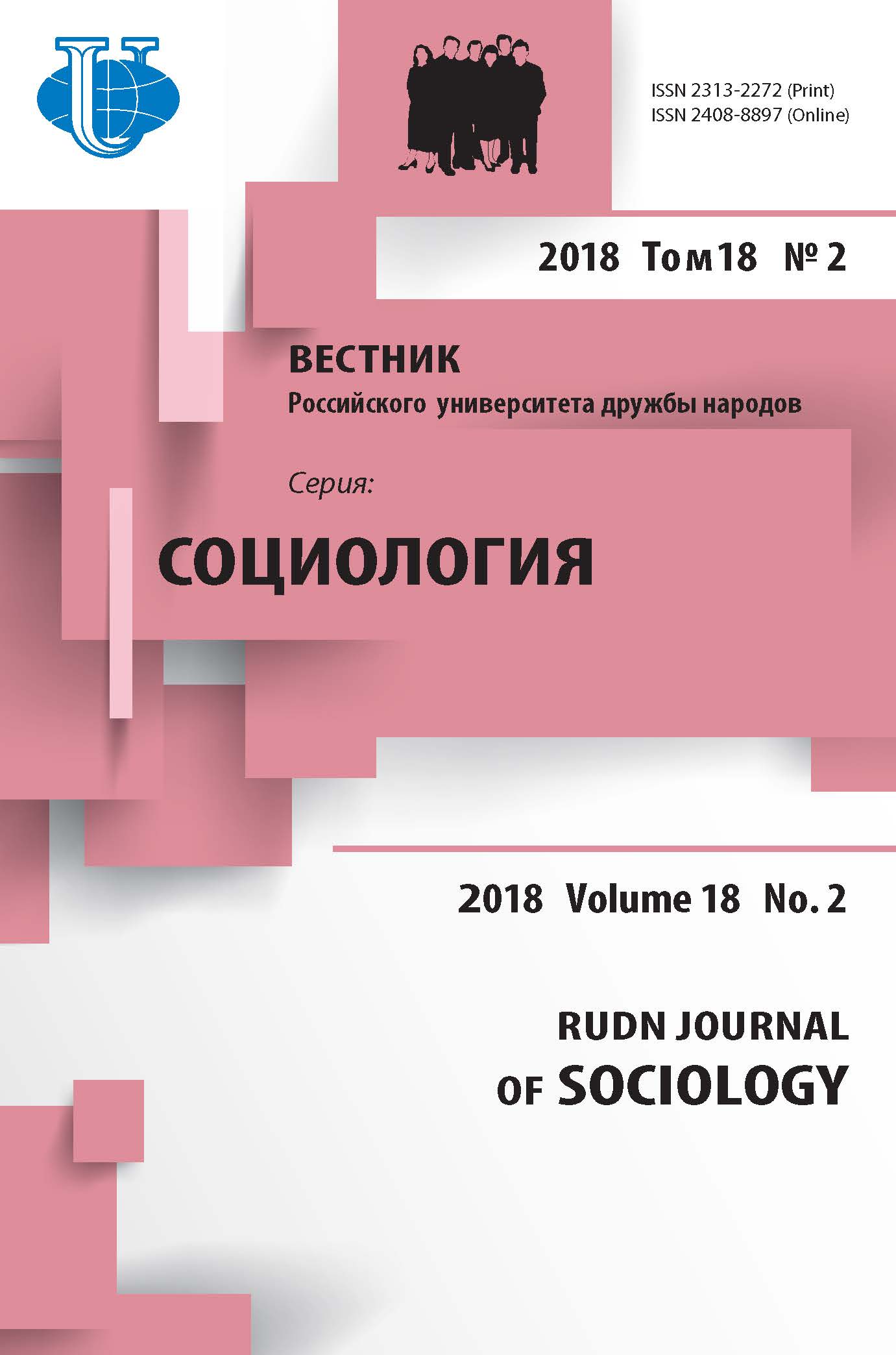The development of non-linear knowledge: New risks, vulnerabilities, and hopes
- Authors: Kravchenko SA1
-
Affiliations:
- Moscow State University of International Relations (MGIMO-University)
- Issue: Vol 18, No 2 (2018)
- Pages: 195-207
- Section: Theory, Methodology and History of Sociological Research
- URL: https://journals.rudn.ru/sociology/article/view/18447
- DOI: https://doi.org/10.22363/2313-2272-2018-18-2-195-207
Cite item
Full Text
Abstract
The article considers the non-linear knowledge as the result of the ‘arrow of time’ effect (I. Prigogine) that determined the new realities in which everything develops increasingly quicker and in a more complex way. The author extends the impact of this effect to the dynamics of knowledge and shows that the modern knowledge acquires the quality of reflexivity and takes on a completely new vector of non-linear development within the so-called ‘turns’ in the history of science. The transition from linear to non-linear knowledge determines more complex manufactured risks including the threat of dehumanization described in the article. The monitoring of these risks implies that the value-oriented non-linear knowledge should be taken into account not only by natural, technical and social sciences but also by the humanities. Among new challenges to the humanity there are vulnerabilities manifested in the increasing structural dysfunctions of complex social and/or techno-natural systems in the form of ‘normal accidents’, ‘collateral damage’, etc. The author believes that key challenges of such vulnerabilities are determined by the dominant pragmatic values of modern knowledge. There is also a new type of development in the form of metamorphosis leading to non-linear transformations, which aggravates the complex character of modern risks and vulnerabilities. The author finds answers to these challenges in the humanistic turn that can ensure the valid knowledge of complex risks and vulnerabilities together with the grounds for better future that people want.
About the authors
S A Kravchenko
Moscow State University of International Relations (MGIMO-University)
Email: sociol7@yndex.ru
Prosp. Vernadskogo, 76, Moscow, 119454, Russia
References
- Adolf M., Stehr N. Knowledge. London, New York: Routledge; 2017.
- Alexander J.C. The Drama of Social Life. Cambridge: Polity Press; 2017.
- Baudrillard J. The Consumer Society. Myths and Structure. London: Sage; 2017.
- Bauman Z. Retrotopia. Cambridge: Polity Press; 2017.
- Bauman Z. 44 Letters from Liquid Modern World. Cambridge: Polity Press; 2011.
- Bauman Z. Collateral Damage. Social Inequalities in a Global Age. Cambridge: Polity Press; 2011.
- Bauman Z. Liquid Fear. Cambridge: Polity Press; 2006.
- Bauman Z., Donskis L. Moral Blindness. The Loss of Sensitivity in Liquid Modernity. Cambridge: Polity Press; 2013.
- Beck U. The Metamorphosis of the World. Cambridge: Polity Press; 2016.
- Beck U. World at Risk. Cambridge: Polity Press; 2010.
- Beck U. Risk Society: Towards a New Modernity. London: Sage; 1992.
- Bell D. The Coming of Post-Industrial Society. A Venture in Social Forecasting. New York: Basic Books; 1973.
- Bourdieu P. In Other Words: Essays towards a Reflexive Sociology. Stanford University Press; 1990.
- Bourdieu P. Homo Academicus. Stanford University Press; 1984.
- Bourdieu P., Wacquant L. The purpose of reflexive sociology (The Chicago workshop). P. Bourdieu, L. Wacquant (Eds.). An Invitation to Reflexive Sociology. University of Chicago Press; 1992.
- Castells M. et al. Another Economy is Possible. Cambridge: Polity Press; 2017.
- Castells M. Networks of Outrage and Hope: Social Movements in the Internet Age. Cambridge: Polity Press; 2015.
- Crane D. Social structure in a group of scientists: A test of the “invisible college” hypothesis. American Sociological Review. 1969: 34.
- Crozier M. Strategies for Change: The Future of French Society. Cambridge: MIT Press; 1982.
- Fukuyama F. The End of History and the Last Man. New York: Free Press; 1992.
- Fuller S. Is future ‘human’, ‘posthuman’ or ‘trunshuman’. 3rd Forum of Sociology. The Futures We Want: Global Sociology and the Struggles for a Better World. Vienna; 2016.
- Giddens A. The Politics of Climate Change. Cambridge: Polity Press; 2009.
- Giddens A. The Third Way: The Renewal of Social Democracy. Cambridge: Polity Press; 1998.
- Giddens A. The Consequences of Modernity. Cambridge: Polity Press; 1990.
- Giddens A., Pierson Ch. Conversations with Anthony Giddens: Making Sense of Modernity. Cambridge: Polity Press; 1998.
- Kravchenko S.A., Salygin V.I. Novyj sintez nauchnogo znanija: stanovlenie mezhdisciplinarnoj nauki [A new synthesis of scientific knowledge: The development of interdisciplinary science]. Sociologicheskie Issledovanija. 2015: 10 (In Russ.).
- Kravchenko S.A. Stanovjaschajasja slozhnaja socialnaja realnost: problemy novyh ujazvimostej [The developing complex social reality: New vulnerabilities]. Sociologicheskie Issledovanija. 2013: 5 (In Russ.).
- Kravchenko S.A. Mosty, soedinjajuschie vsevozmozhnye raskoly sociologii radi bolee ravnogo mira [Bridges connecting all possible dissents in sociology for a more equal world]. Sociologicheskie Issledovanija. 2015: 2 (In Russ.).
- Kravchenko S.A. Pereotkrytie socialnoj realnosti kak pokazatel validnosti sociologicheskogo znanija [Re-discovery of social reality as an indicator of the sociological knowledge validity]. Sociologicheskie Issledovanija. 2014: 5 (In Russ.).
- Kuhn T. The Structure of Scientific Revolutions. University of Chicago Press; 1970.
- Merton R. On Social Structure and Science. University of Chicago Press; 1996.
- Merton R. On the Shoulders of Giants. Chicago-London: University of Chicago Press; 1993.
- Merton R. The unanticipated consequences of purposive action. American Sociological Review. 1936: 1.
- Merton R. Sociological Ambivalence and Other Essays. New York: Free Press; 1976.
- Perrow Ch. Normal Accidents: Living with High-Risk Technologies. Princeton University Press; 1999.
- Perrow Ch. The Next Catastrophe: Reducing our Vulnerabilities to Natural, Industrial, and Terrorist Disasters. Princeton University Press; 2011.
- Prigogine I. The End of Certainty. New York: Free Press; 1997.
- Sassen S. Expulsions: Brutality and Complexity in the Global Economy. Cambridge: Belknap Press, Harvard University Press; 2014.
- The Futures We Want: Global Sociology and the Struggles for a Better World. 10-14 July 2016, Vienna.
- Urry J. What is the Future? Cambridge: Polity Press; 2016.
- Urry J. Climate Change and Society. Cambridge: Polity Press; 2011.
- Urry J. Global Complexity. Cambridge: Polity Press; 2003.
- Welz F. The President’s welcome. 13th Conference of the European Sociological Association. (Un)Making Europe: Capitalism, Solidarities, Subjectivities. Athens, 2017.














